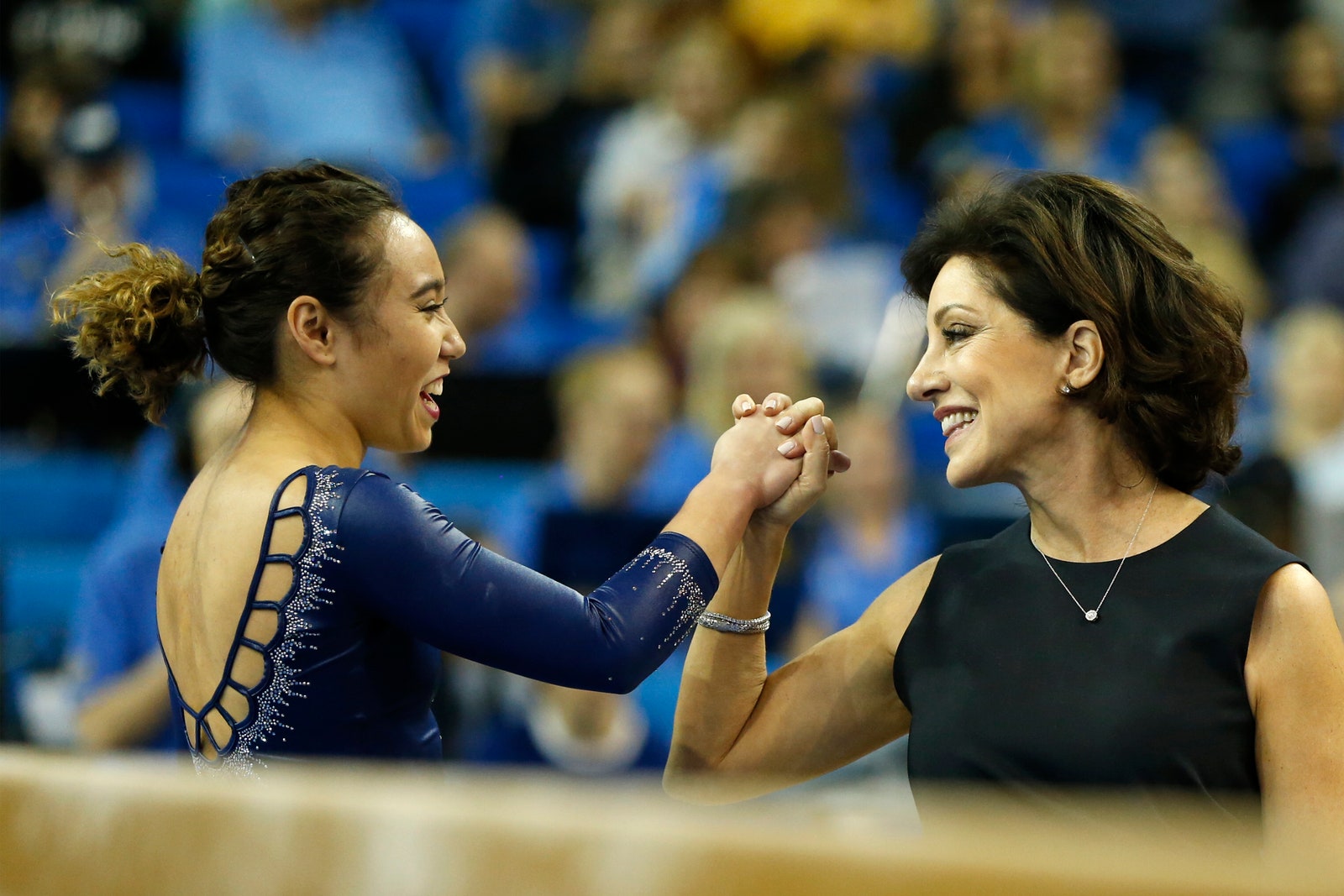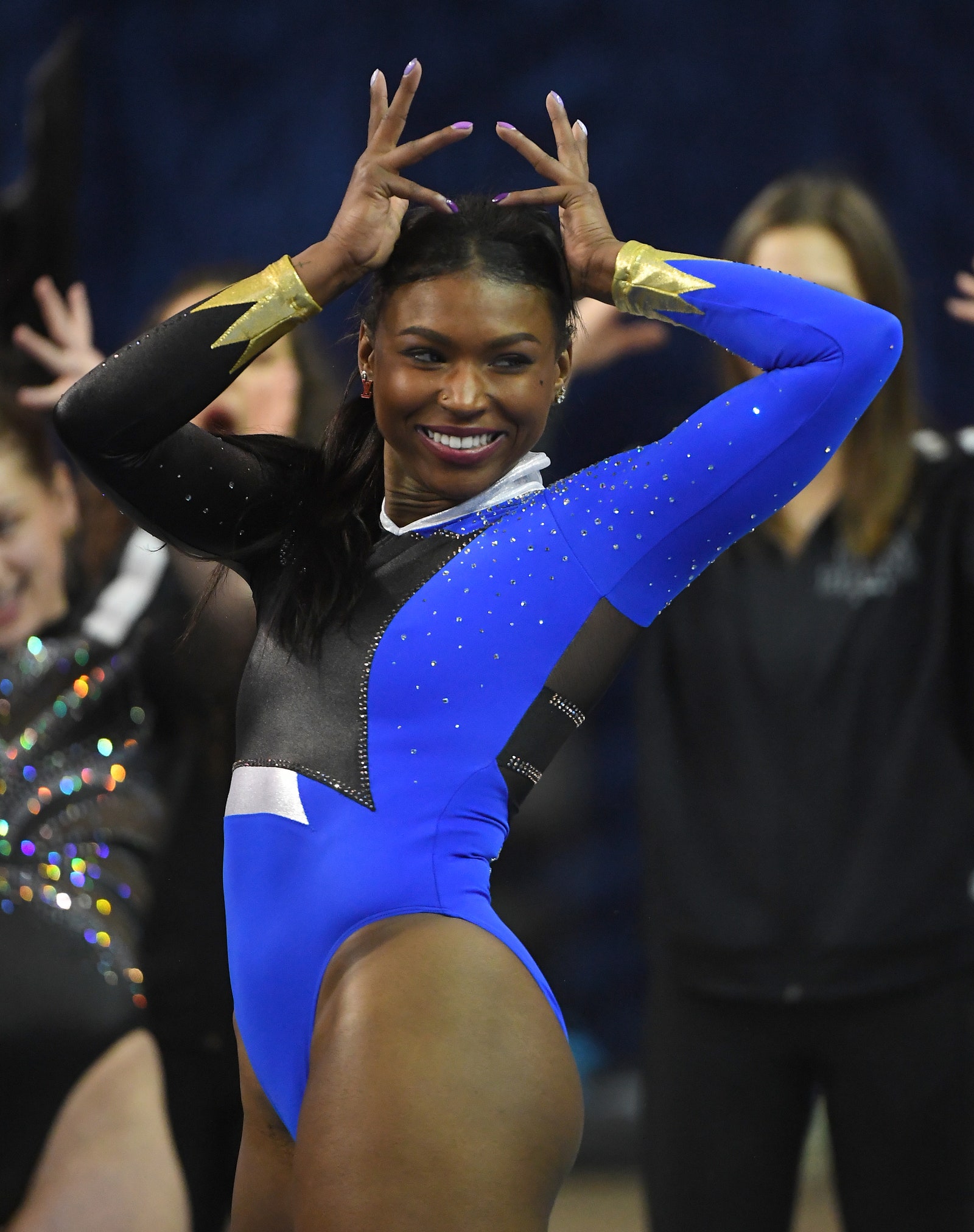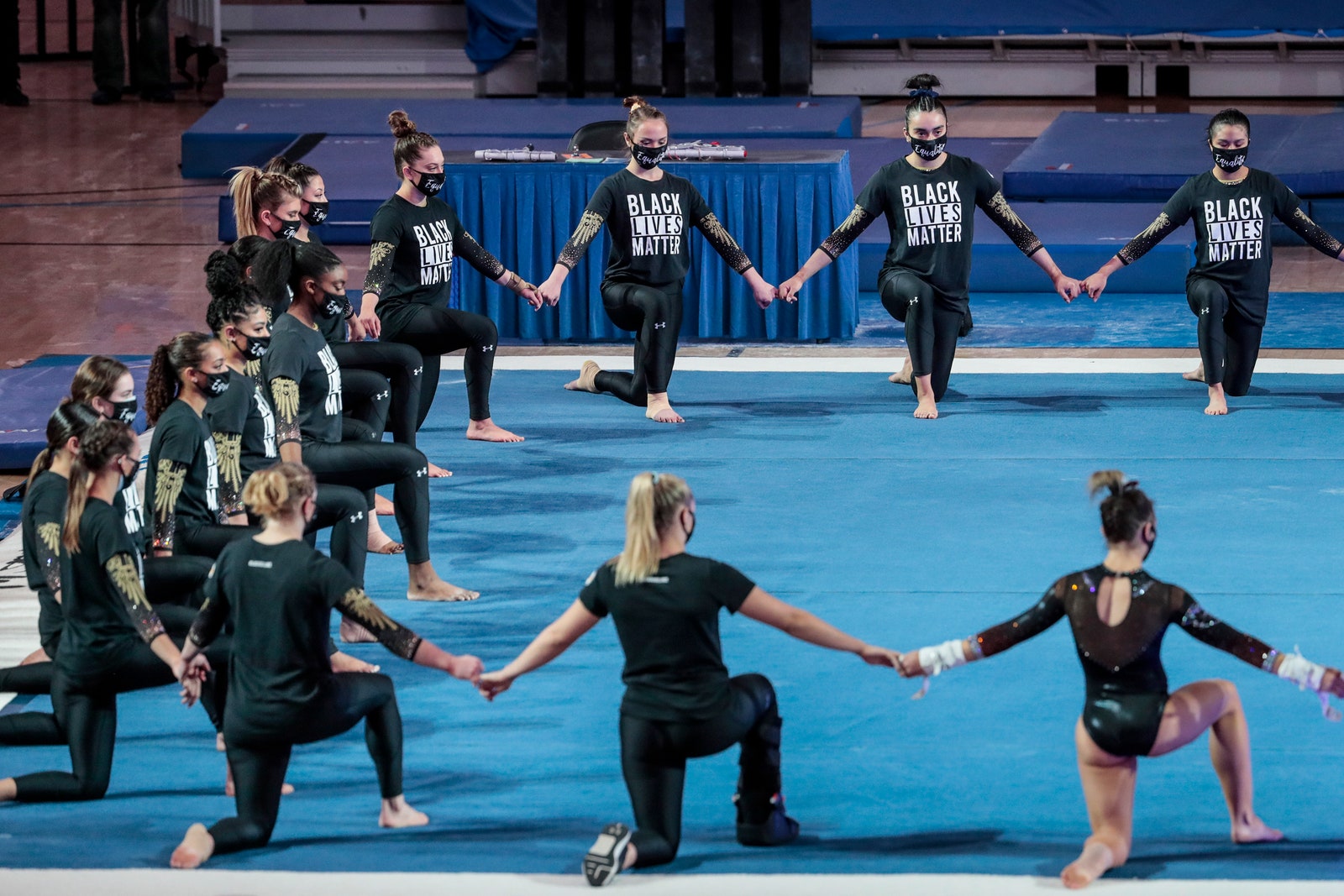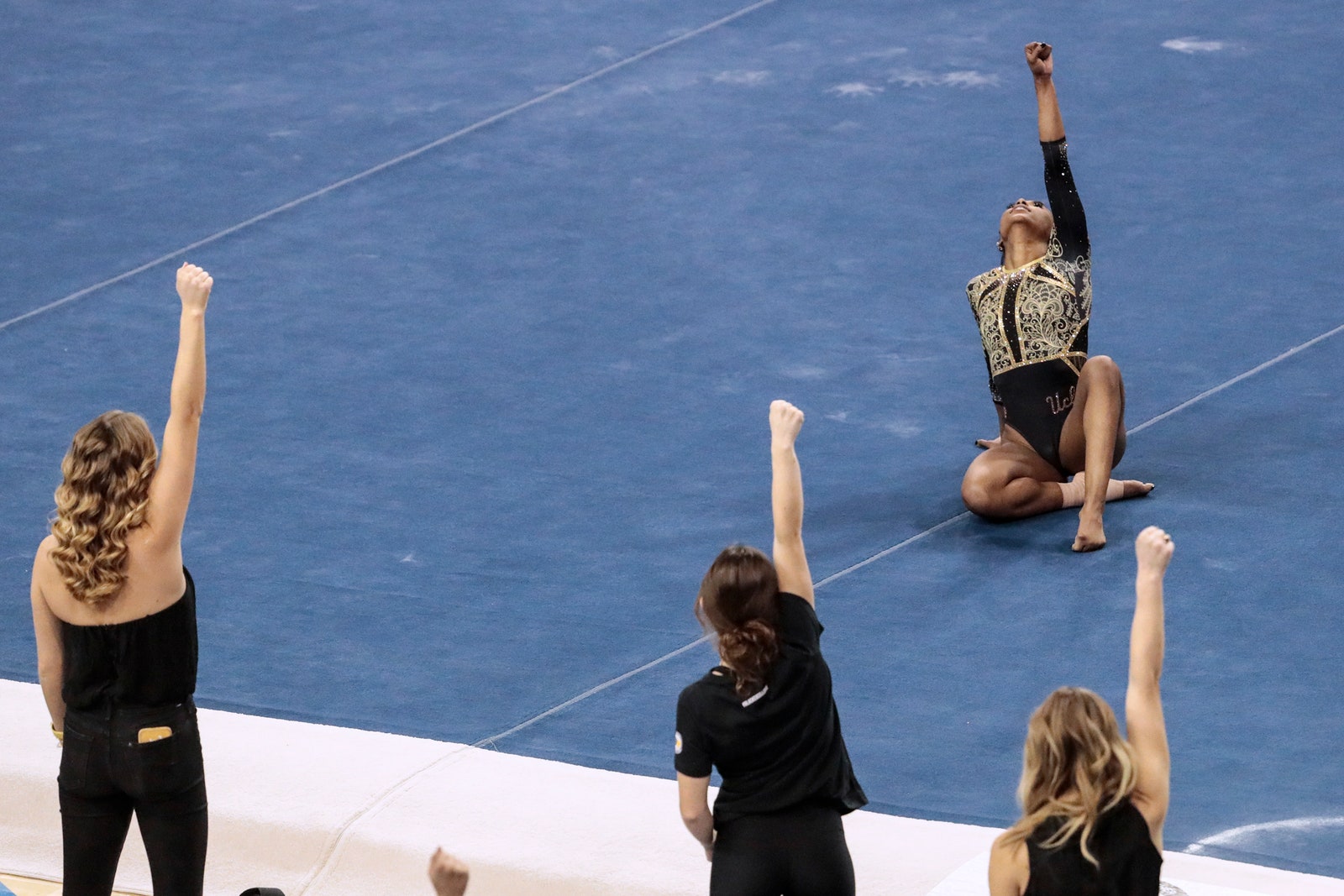They won’t be in Tokyo but their viral she’s-in-control performances have helped the sport shake the specter of abuse.

The Women of UCLA Brought Joy Back to Gymnastics
Gymnasts tend not to get a lot of attention (unless of course they’re named Simone Biles) outside of the Olympic hype that pulls us all together once every four years to watch young women, most of whom are still in their teens, defy gravity and fear with increasingly difficult stunts. But over the past year, the most talked about gymnasts aren’t those heading to Tokyo—chances are the UCLA gymnastics team has landed on your newsfeed with a viral video so epic, so in-control, and so joyful, the only appropriate response from the tens of millions of people watching it is “Oh shit!”
The team has a deep bench of talent—in recent years their roster has been stacked with Olympians including Kyla Ross and Madison Kocian, and NCAA champions like Katelyn Ohashi and Peng Peng Lee. But their significance in the sporting world goes beyond medals. Over the past year, as we faced the harsh realities of the pandemic, staged protests against gender-based violence, and collectively reckoned with systemic racism, the UCLA women’s gymnastics team gave us something radical in our timelines: joy. Here was a team of young women in full command of their bodies, sharing optimism, celebrating Black excellence. It’s no wonder their routines had more views than the last Olympic finals.
“I think it's their fearlessness and their boldness that really sucks out—the authenticity they show on the mat and off,” says BJ Das, a volunteer assistant coach with the team and the choreographer behind many of the viral routines. “And then on top of that, I think they are not afraid to use their voice.”
In a sport that has—at least in recent memory—been defined by the abuses of men in power, the UCLA women’s gymnastics team is reclaiming the narrative. Gymnastics has always been entertaining: “Why is women's gymnastics the number one sport in the Olympic games? They’re freaking superheroes,” says Valorie Kondos-Field, the legendary coach of UCLA women’s gymnastics who led the team from 1991 to 2019 when she retired. This is a new era of gymnastics, one every bit as skillful as the sport you grew up fawning over, but also one where the superheroes are obviously in control—and having a great freaking time.
UCLA’s particular brand of gymnastic joy is resonating. The team has produced killer athletics for years, but in 2019 something happened. Her name was Katelyn Ohashi, a then senior, who, assisted by Kondos-Field's choreography and Tina Turner’s vocals, gave a perfect 10 floor routine performance so out-of-control joyful it garnered 171 million views. (For reference, half that watched Tom Brady and Patrick Mahomes face off in the last Super Bowl, the most watched sporting event of the year). “I don't know how many millions of gymnastics fans there are out there but I don't think there's 170 million,” says Kondos-Field. Ohashi had hit on something much bigger.
Then came Nia Dennis, a senior who first went viral in 2020 (pre-pandemic) for her Beyonce-inspired floor routine that perfectly nailed the spirit of the Queen herself, and then dominated social media again in January of 2021 with a routine celebrating black excellence that has over 11 million views on Twitter. A month later, sophomore Margzetta Frazier was hitting our timelines with a Janet Jackson-inspired routine so good it moved the mega star to pick up the phone and FaceTime her.
https://twitter.com/uclagymnastics/status/1353398409038680065
https://twitter.com/SportsCenter/status/1359958283201740801
“When I'm giving them choreography, I want to make sure that it's something that they enjoy, that they connect to and that they feel like is a true expression of them. That was the intent with these routines—like this is for you,” says Das. “I want them to enjoy it. And I want them to feel proud. Luckily the effect of them doing something they love was this communal feeling of joy and fun and light in a time when our country, and the world, certainly needed more of it.”
That joy-first approach is Kondos-Field’s legacy. Miss Val, as all the athletes call her, was never actually a gymnast herself (she came to the sport by way of dance and theatre), so when she started coaching she looked at the regimented culture of gymnastics as an outsider. “It was really obvious to me early on coaching these elite athletes that they didn't have a voice and that their only self worth came from being a gymnast and scoring well, ” she says. “It was like, ‘No, no, no. You're a human being.’ That was my number one goal, to fortify them as whole human beings.”
The specter of abuse that hangs over elite gymnastics is grisly. More than just crimes committed by one individual, dozens of athletes have spoken out about the pervasive culture of mental, physical, and emotional abuse perpetuated in the sport. “It felt like you were praised if you were a robot, like if you just were this perfect gymnastics machine that did what you were told and smiled,” says Das, who was a competitive gymnast at the University of Washington before an injury forced her to retire. For the past four years, it’s often felt like the abuse overshadows the work of the athletes. But that is changing. “I feel like the way the sport is going now, giving more power to the athletes, gymnastics is going to be at the forefront of women's sports and giving athletes a voice,” says Das. “These women are going to have a voice that transcends their sport.”
If women actually liking what they do is the future of the sport, the UCLA women’s gymnastics team is proving it works. Kondos-Field remembers a meet a few years ago: “I had a head coach come up to me and say, ‘You know I really think you would do a lot better if you weren't having so much fun on the floor.’ And I was like, ‘Hmm. Well who do you think has the most fun on our team? Would you agree it's Peng-Peng Lee? She just got a 10 on bars. Who has the next most fun? Would you agree it's Katelyn Ohashi? Well guess what? She just had the meet of her life. So, okay thank you for the advice.’ The next year, we had even more fun and we won.”
That obvious vibe is what drew Dennis to UCLA in the first place. That and the diversity of the team—still rare in a sport that’s spent most of its history populated by the overwhelmingly rich and white. “A lot of times you see the same type of gymnast,” she says. “All my life, I felt like I couldn't even fit in with my team and my teammates. So to come in and know that everybody had different backgrounds and different cultures that were all celebrated, I definitely wanted to be in an environment like that.”
At UCLA, she found herself in a gym where using your voice and having tough conversations was encouraged. “We have conversations about politics and we have conversations about race. We have conversations about women's rights and feminism and pride and gay rights—we want to create an environment where everybody feels like they can have a voice because we've always been silenced in this sport,” Dennis says. “That's allowed us to really take control of our gymnastics and the way that we want to have a voice in real life, not just in the gym.”
The result was a season marked not just by viral routines, but real activism. In February, the team hosted the first Black excellence meet, taking a knee in Black Lives Matter t-shirts before the meet, wearing specially designed leotards and raising their fists in a symbol of power and solidarity during each routine.
“We are at a point now where athletes hold the leverage because not only can we say what we want to say, we'll also have potentially millions of people backing us up,” says Margzetta Frazier. “Gymnasts are taking no BS. They’re calling the shots.”
Rediscovering joy in the sport certainly doesn’t erase the trauma that characterized years of training for so many athletes. “It has shaped us and made us stronger women,” says Dennis. “But we definitely want to add on joyous memories because it's not all negative. It's really a great environment to be free and to be successful and to become your best self.”
“I am optimistic because we are finally getting listened to,” adds Frazier. “And I love that.”
Macaela MacKenzie is a senior editor at Glamour. Follow her on Instagram and Twitter.
This story originally appeared on: Glamour - Author:Macaela MacKenzie
































